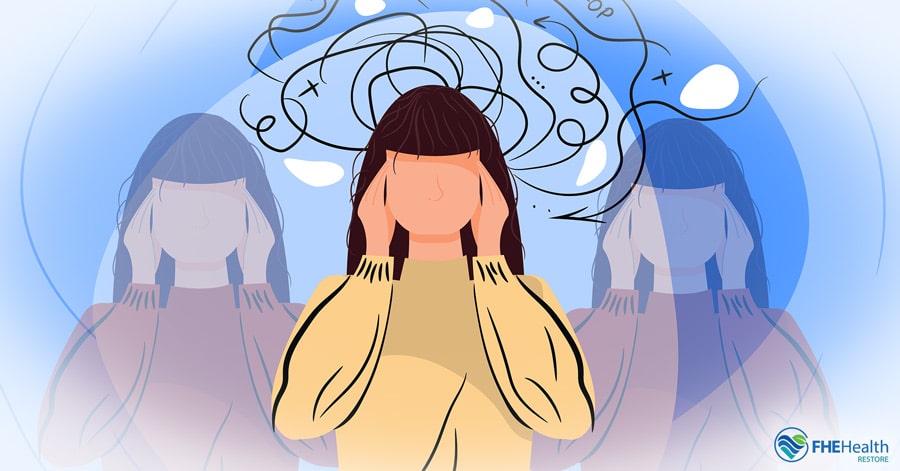The National Center for Biotechnology Information reports that between 0.6% and 1.9% of people in the United States have schizophrenia. This complex mental health condition is characterized by disordered thought patterns, hallucinations, delusions and other symptoms impacting a person’s ability to function.
Treatment centers for schizophrenia can assist people who have this diagnosis. Unfortunately, few centers provide the focused and specialized medical care necessary for effective schizophrenia programs. In this guide, we provide detailed information about rehab for schizophrenia so you can understand what to expect if you’re considering inpatient treatment for yourself or a family member.
The Importance of an Accurate Schizophrenia Diagnosis
It can be difficult to diagnose schizophrenia since doctors don’t have a definitive test for this condition. Symptoms of schizophrenia are similar to signs of other mental health disorders. You may also develop similar symptoms with substance abuse or use of prescription medications.
To further complicate matters, schizophrenia often co-occurs with other mental health issues, including major depressive disorder, obsessive-compulsive disorder, post-traumatic stress disorder and substance use disorder. In addition, the Cleveland Clinic reports that between 50% and 90% of people who have schizophrenia are unable to recognize the fact that they have a mental health disorder.
If your healthcare provider suspects that you have schizophrenia, they will take steps to rule out other physical and mental health conditions, including substance abuse. Diagnosis typically requires:
- Screenings for medical conditions that cause similar symptoms. The screenings may include a physical examination, blood test and imaging tests like CT and MRI scans.
- A comprehensive mental health screening. This includes detailed questions about your personal and family health history. The healthcare provider will examine your demeanor and ask about violent thoughts or actions, substance use, visual and auditory hallucinations, delusions and your moods.
Getting an accurate diagnosis of schizophrenia is essential for access to effective treatment. In fact, receiving medical care as soon as possible after you develop symptoms can improve your chances of positive outcomes. However, it usually takes about six months of observation for healthcare providers to assess someone with suspected schizophrenia.
The Difficulty of Finding Treatment for Schizophrenia
Schizophrenia is a complicated, chronic mental illness requiring long-term management for successful outcomes. As a result of the extensive necessary resources for successful care, it can be difficult to find inpatient schizo treatment.
Effective management of schizophrenia symptoms requires a combination of psychosocial therapy, medication and strong family support. Antipsychotic medications reduce troubling symptoms like delusions and hallucinations. However, they also cause unwanted side effects that make it difficult for some people with schizophrenia to take prescribed drugs as directed.
When individuals stop their medications against doctor instructions, symptoms typically recur and often worsen. If this occurs repeatedly, it decreases the efficacy of these medications to treat schizophrenia symptoms, and you may require a higher dose of antipsychotic drugs to get the necessary effects. Visiting your primary care provider for regular monitoring can help you take the medication you need to manage this chronic mental health condition.
In combination with medication, individual and group psychotherapy can provide support as you develop coping strategies for living with schizophrenia. Cognitive behavioral therapy may help resolve symptoms that don’t respond well to medication.
Rehabilitation Outcomes for People Who Have Schizophrenia
Schizophrenia is very difficult to treat effectively. According to the National Institute of Mental Health, it’s one of the 15 most common causes of worldwide disability. Many people who have a schizophrenia diagnosis do best in assisted living facilities where they can get help with medication management and daily activities. However, people who manage their symptoms with the help of a team of medical professionals can often improve their quality of life.
According to data from the Cleveland Clinic, schizophrenia symptoms get worse over time for about 33% of people with this diagnosis. This can occur because these individuals don’t follow the treatment plan recommended by their healthcare providers or because their symptoms don’t respond to treatment. If left untreated, schizophrenia increases the risk of physical health problems like heart disease and substance use disorder.
About one-third of individuals with schizophrenia find their symptoms generally respond to treatment. While they also experience periodic relapses when they have trouble handling the condition, they can lead normal lives and keep schizophrenia symptoms under control.
The final one-third of people who have schizophrenia have positive care outcomes. This category represents people who thrive with schizophrenia treatment. These individuals experience symptom remission when they follow the care regimen recommended by their healthcare providers. They’re able to live without being severely affected by schizophrenia once the condition is managed successfully.
People with schizophrenia can improve their outcomes by following their care plans closely. They can also benefit from lifestyle changes, including regular exercise and a healthy diet.
Finding the Right Rehabilitation Setting for Schizophrenia Treatment
Programs for schizophrenia must be able to address both this condition and any dual diagnoses, such as substance use disorder. Careful research can ensure you find a facility that provides the appropriate schizophrenia residential treatment for you or your family member. The most important aspects of a schizophrenia treatment program include:
- Regular check-ins with a healthcare provider who gets to know you and understands your symptoms
- Adherence to a medication regimen, which may require trial and error to find a drug that’s effective for your symptoms without disabling side effects
- Help with substance abuse, as drugs and alcohol can worsen schizophrenia symptoms and make it hard to manage this chronic condition
If you’ve been experiencing symptoms of schizophrenia, Restore Mental Health can help you get an accurate diagnosis and begin working with our experienced care team on a personalized recovery plan. Call us today to speak with a professional counselor day or night for the assistance you need to lead a full and healthy life in the face of mental health challenges.



